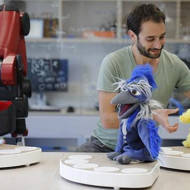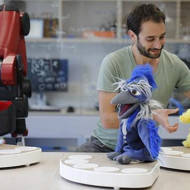
Israeli ‘Social Robots’ Revolutionize Learning in Post-Corona World

Researchers develop ‘social robots’ that can help teach kids and ease pandemic pressures on schools.
By Yakir Benzion, United With Israel
A unique study conducted at the “Curiosity Laboratory” at Tel Aviv University’s engineering school showed that using robots to help teach 5 to 9-year-olds how to decipher words created a quantum leap in student achievement.
They study was done in two stages, first checking the knowledge of words of a group of about 50 children and their ability to identify verb roots and nouns.
It was found that even the older children in the group showed little ability in active root identification based on what they had learned in school. On average, the children answered only two questions correctly out of the 10 presented to them.
The next stage lasted three weeks, during which the kids participated in 7-15-minute lessons led not by a teacher, but by a social robot the researchers designed. The robot taught the children in Hebrew to identify the roots of verbs and names, such as rolled, behaved, computer, fountain, lock, and clothes.
Through a series of questions and answers and a presentation of words and their roots in a regular rhythmic melody, the children developed the skill of extracting the roots of the words. However, unlike school classes, where children sit in their seats throughout the class, the robot named Patrick also got the children moving in various activities, asking during the activity to identify the relevant roots.
For example, the robot asked the children to jump in the room and shout the verb’s root “jump”, then smile and say verb’s root “smile”. The robot then told himself the correct answer and praised the children for their participation.
At the end of the series of lessons, the children were tested and they answered 7 out of the 10 questions correctly. Even more satisfying to the researchers was that the younger children improved more and reached similar levels to those of the older children.
Dr. Goren Gordon explains that his Curiosity Lab is working on developing social robots for education and teaching purposes, so that learning content can be taught in an experiential and fun way at a low cost. One of the robots, Patrick, was developed and 3-D printed in the lab.
“Against the background of the corona crisis, in which the education system needs creative solutions, there is no doubt that learning through robots can help in educational institutions,” said Dr. Einat Gonen of the Department of Hebrew Language and Semitic Linguistics at Hebrew University, who participated in the project.
Gonen noted that education guidelines are calling for smaller class sizes and for children to learn in smaller groups, which is an ideal environment for the robots.
“Social robots can be teaching assistants throughout the education system, both at young ages and among high school students,” said Gordon, who heads the Curiosity Laboratory. “Robots can effectively teach content in different contexts, in individual instruction, in groups or in front of an entire classroom.”
HELP ISRAELIS BATTLE CORONA!
Donate to the Corona Emergency Relief Fund. Coronavirus has taken a huge toll on the people of Israel. The poor, elderly and ill are most vulnerable.
Israeli soldiers, security officers and medical care providers operate under great danger and risk to life.
Over 1 million Israelis are out of work. Many cannot make ends meet. We provide financial aid, food, medical supplies and more. Funds are distributed where needed most. The time to act is now!
United with Israel